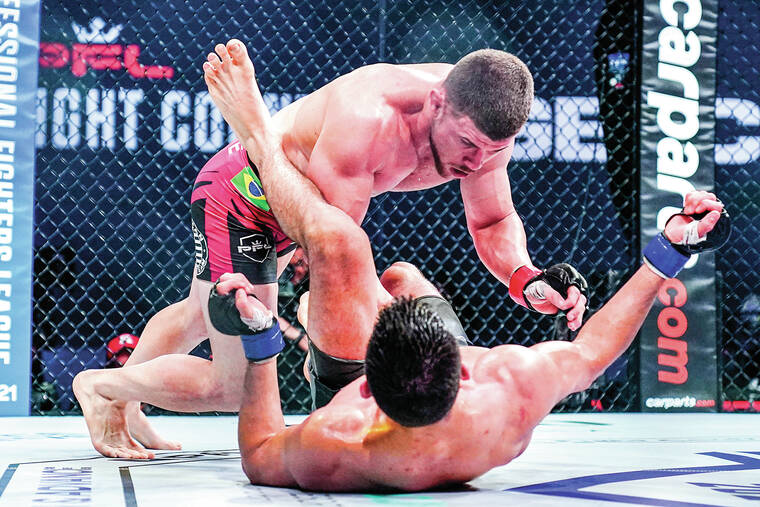Mixed martial arts investment latest example of Saudi Arabia’s foray into global sports
LAS VEGAS — Saudi Arabia’s most recent venture into the global sports scene — purchasing a stake in the Professional Fighters League — is yet another example of the oil-rich kingdom using athletics to increase its influence.
The purchase was relatively modest — $100 million according to the Financial Times — but even in a minority role, Saudi-backed SRJ Sports Investments ensured mixed-martial arts events will take place in that country.
ADVERTISING
Though the financial figure likely won’t scare the rival UFC, which is worth $12 billion, SRJ Investments has made clear this is just an initial investment. The agreement also allows the PFL, which uses a regular season and playoff format more common to team sports, to encroach into the UFC’s Middle East territory. The UFC regularly holds events in Abu Dhabi, the capital of the neighboring United Arab Emirates.
On a larger scale, the investment into PFL fits into Saudi Arabia’s overall strategy of having a major presence in the sports world while putting forward the message it is a much more open society, particularly as it relates to women’s rights. However, it also comes as Saudi Arabia’s Crown Prince Mohammed bin Salman faces international criticism over the kingdom’s war in Yemen, the 2018 killing of Jamal Khashoggi and other allegations of human rights abuses.
“SRJ is shaping a new era of sports in Saudi Arabia and accelerating the growth of the domestic sports economy,” SRJ Chairman Bander Bin Mogren said in a statement. “This investment aims to nurture the local and regional talent pool in martial arts, promote gender equality in sport, and bring new opportunities directly to Saudi Arabia and the wider … region.”
SRJ is under Saudi Arabia’s Public Investment Fund, a sovereign wealth fund fueled by the kingdom’s oil wealth that’s made a series of moves into international sports at what appears to be Prince Mohammed’s direction. Chief among them was creating the LIV Golf tour and enticing some of the world’s top players with signing bonuses that included some in six figures. LIV now may merge with the PGA Tour.
Saudi Arabia also is on a billion-dollar spending spree to attract some of the world’s top soccer players, including Cristiano Ronaldo for about $200 million a year. The kingdom also bought British soccer club Newcastle United.
SRJ declined to comment publicly beyond the statement in the news release announcing the deal. Saudi officials did not respond to a request for comment from The Associated Press about their plans for the mixed marital arts venture. However, it follows the playbook of the other purchases and the hosting of sporting events ranging from boxing matches to Formula One — making Saudi Arabia known on the world stage.
“It works,” said David Carter, sports business professor at the University of Southern California. “I was at the World Cup final in Moscow and I was there for a week and watched the ongoing attempt at the image remake in Russia. We’ve seen it in China. And now we’re really seeing it with checkbook diplomacy around U.S. sports assets, and I think it is causing concern. Is it going to be an ongoing discussion that harms the U.S. domestic sports brands?”
Critics refer to the move as “sportswashing” — using the competition to draw attention away from criticism about the kingdom’s conduct. Under Prince Mohammed, women can now drive and there has been a liberalization socially in this ultraconservative nation that’s home to the holiest sites in Islam.
The concept of “sportswashing” remains a controversial one.
Law professor Stephen F. Ross, co-director of the Penn State Center for the Study of Sport in Society, said in an email that he has “yet to see evidence that sportwashing works.”
“It is my general sense, for example, that for every American who developed a high opinion of Qatar because of the positive stories about how they organized the (2022) FIFA World Cup,” Ross wrote, “there were at least three Americans who previously had never heard of Qatar, couldn’t tell you if Doha were closer to Las Vegas, Tel Aviv, or Tokyo, and now have learned about the human rights violations, gender discrimination and homophobia in that nation.”


